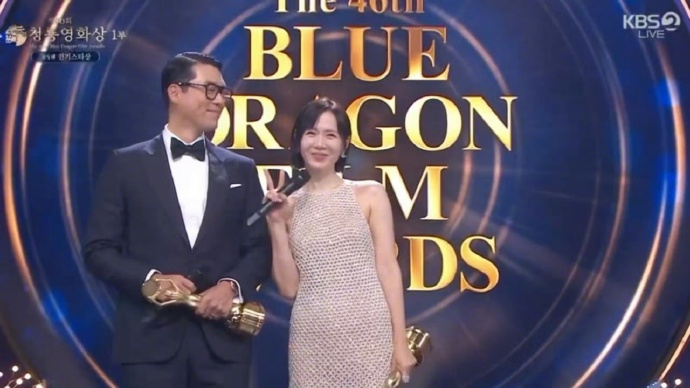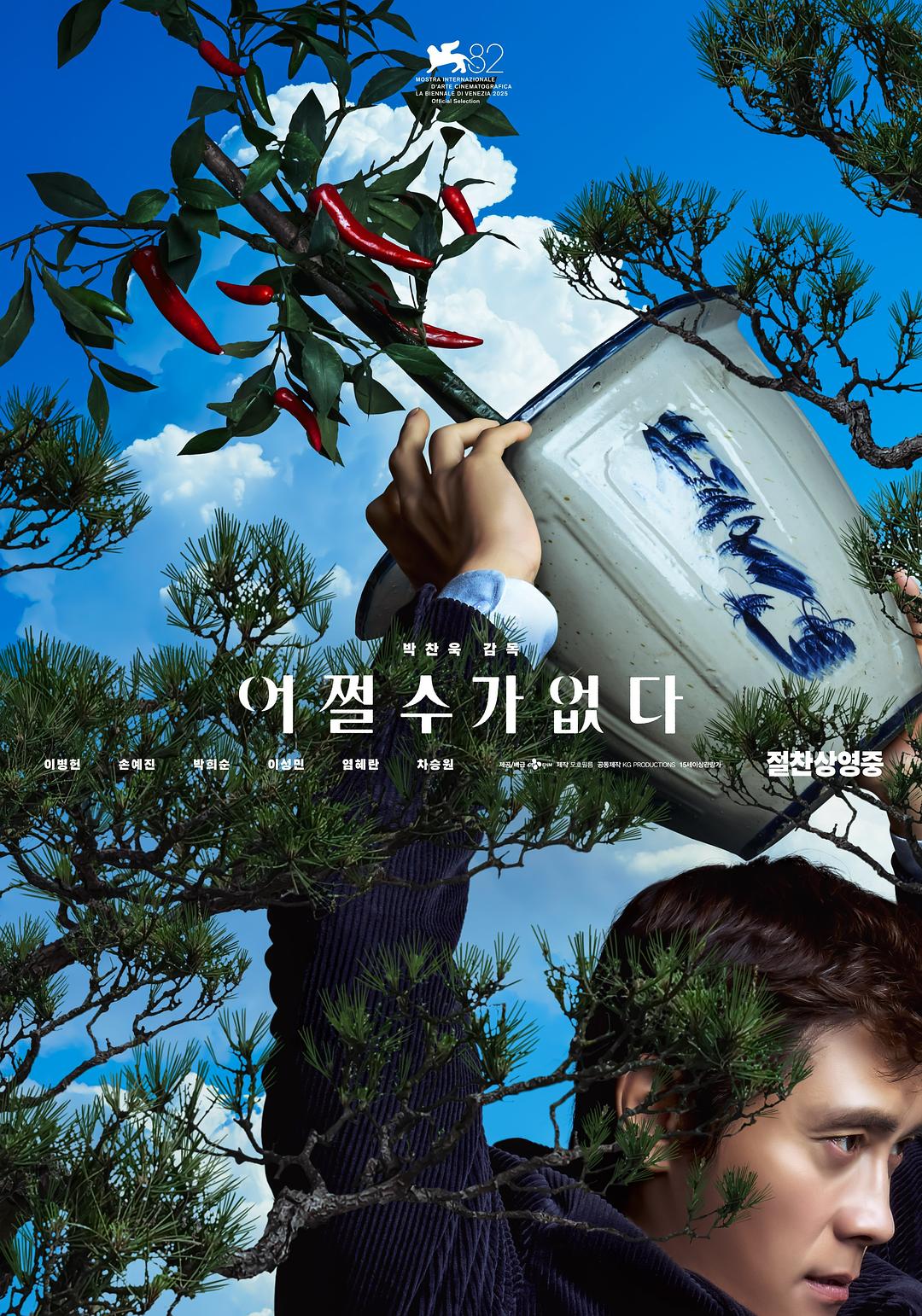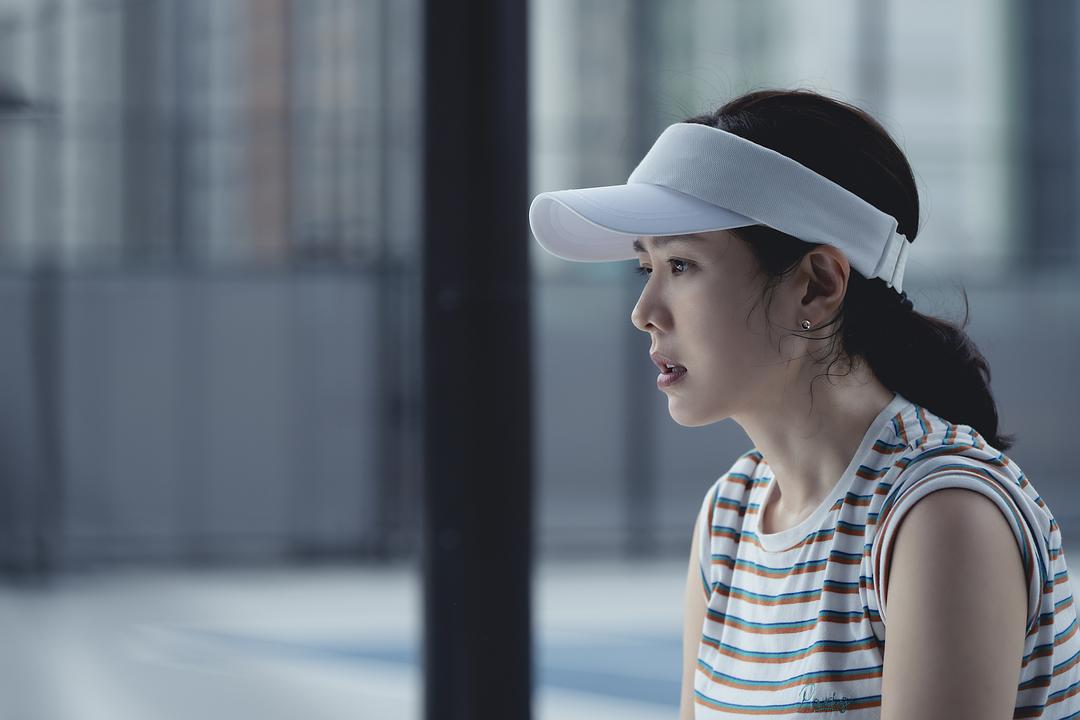
The 46th Blue Dragon Film Awards ceremony has just concluded. Park Chan-wook's dark comedy "Against the Will" emerged as the biggest winner, sweeping six awards including Best Film and Best Director. Hyun Bin and Son Ye-jin, a highly popular couple in the Korean entertainment industry, won Best Actor and Best Actress respectively for their roles in "Harbin" and "Against the Will," creating a memorable story in the film world.

Hyun Bin and Son Ye-jin accepted an award together.
The Big Winner: Park Chan-wook's Social Allegory
The film "Helpless" won six awards, including Best Film, Best Director, Best Actress, Best Supporting Actor, and Best Music. The film is a project that Park Chan-wook has been preparing for 17 years. He said at the 2019 Busan International Film Festival that this would be his "life's work".
The film is adapted from the novel *The Axe* by American author Donald Weslake. It tells the story of a middle-class man who, after being laid off from the paper company where he had worked for 25 years, resorts to extreme measures to find new employment. The protagonist, Yoo Man-soo (Lee Byung-hun), is a veteran in the paper industry with 25 years of experience, but suddenly loses his job due to massive layoffs following the company's acquisition by an American company. After more than a year of unsuccessful job hunting, his family's financial situation deteriorates, forcing them to mortgage their home. In desperation, Man-soo conceives a wicked idea: only by eliminating his competitors can he secure a job.

Poster for "Helpless"
From his early "Vengeance Trilogy" to "Decision to Break Up," Park Chan-wook's works have always been permeated with a personal value proposition tinged with a sense of the uncanny. In "Helpless," his authorial style remains evident: the characters' abnormal motivations and unconventional presentation methods conceal a chilling sense of unease that lingers upon reflection, as well as an anxiety that has nowhere to hide in the torrent of the times.
Similar to Bong Joon-ho's *Parasite*, which won the Palme d'Or at Cannes a few years ago, the latter delves into the class issues in South Korean society. While *Parasite* peels back the facade of upper-class privilege, *Helpless* focuses on the vulnerability of the middle class—when a skilled worker with 25 years of experience loses everything overnight, and the cost of maintaining a "decent life" far exceeds his actual income, Park Chan-wook vividly portrays the anxiety and despair of the middle class with dark humor. Many seemingly exaggerated scenes in the film also contain profound social metaphors. Yoo Man-soo's personal tragedy, in an era of economic downturn, seems to represent the entire middle class bound by the illusion of respectability, futilely maintaining the status quo in the gap between rationality and anxiety.
In an interview at the Venice Film Festival this year, Lee Byung-hun, the film's lead actor, mentioned that when he first read the script, "I felt that the overall atmosphere was very bitter, but after reading it, I found it very funny. I even doubted whether I had read it wrong." He even asked director Park Chan-wook, "I laughed while reading it. Is that right? Is that what you originally wanted?" Park Chan-wook's answer was, "The funnier it is, the better it is for me."

Poster for "Helpless"
At the same time, the film's portrayal of the survival struggles of the South Korean middle class resonates emotionally with audiences worldwide. In an interview, Park Chan-wook stated, "South Korea is a society that shares common problems with the rest of the world. The issues South Korea is experiencing are not fundamentally different from those faced by other countries: artificial intelligence, the employment crisis, the middle-class crisis, even the issue of masculinity in society. These problems have developed in South Korea at a pace almost identical to those elsewhere in the world. I believe this is a major reason why I chose this story, why it so captivated me, and why I've been so invested in it for twenty years."
Hyun Bin and Son Ye-jin's joint award win has brought both honor and controversy.
The biggest highlight of this year's Blue Dragon Film Awards was undoubtedly the wins of Best Actor and Best Actress by Hyun Bin and Son Ye-jin respectively for their roles in the films *Harbin* and *Helpless*. They became the first married couple in the award's history to simultaneously win both Best Actor and Best Actress, and also received the Popularity Star Award. The two have maintained a strong on-screen chemistry since their collaboration on *Crash Landing on You*. Hyun Bin also showed his affection for his wife on stage, expressing special thanks to her in his acceptance speech, describing her as "my wife Ye-jin, whose mere existence gives me immense strength," and adding, "And to our son, I want to tell you that I love you very, very much."

Hyun Bin thanked Son Ye-jin at the awards ceremony.
With her outstanding performance in "Helpless," Son Ye-jin achieved a "double grand slam" of awards at the Blue Dragon, Baeksang, and Grand Bell Awards, becoming the first actress in Korean film history to achieve this feat. She plays Mi-ri, the wife of the male lead Yoo Man-soo (Lee Byung-hun). While not a traditional leading lady, the complexity and inner tension of her character provided ample room for her performance; her screen time was limited but crucial.

Son Ye-jin makes her post-pregnancy comeback with the film "Helpless".
This role marks her first since returning to acting after giving birth, and her experience with raising children adds "emotional depth" to her performance. During an interview while promoting the film, she discussed the changes in her life after childbirth, a real-life experience that helped her better portray the mother in the film. Meanwhile, Hyun Bin, who won Best Actor for "Harbin," elevated the entertainment value of this year's Blue Dragon Film Awards to a new level.
However, the reception of "Harbin" after its release in South Korea and its online streaming service was polarized, encountering considerable controversy in both China and South Korea. Despite its promotional claims of high production quality, accurate historical scenes, and excellent action sequences, the overall reception was not high, with a Douban score of approximately 5.3. Its box office in South Korea also faltered, attracting only 4.7 million viewers, far short of the expected 10 million. South Korean audiences felt it was a waste of its strong cast and criticized its portrayal of the Korean national hero Ahn Jung-geun. Chinese viewers also criticized the film's inappropriate title and historically inaccurate locations, arguing that using "Harbin" without filming in China and misrepresenting Jilin's terrain as the "Manchurian desert" was biased.
Meanwhile, controversies surrounding perceived bias in the judging process persisted: the low-budget film *Faces Places*, produced with only 200 million won, garnered the approval of millions of viewers but received no awards; *My Zombie Daughter*, the year's box office champion, only won the Audience Award, missing out on the core awards; coupled with discussions surrounding the fairness of Son Ye-jin's role and the award, a series of controversies led to this year's Blue Dragon Film Awards being labeled as "prioritizing hype over artistry." Behind this phenomenon lies the real dilemma of the South Korean film industry in a sluggish market—authoritative awards must both boost viewership and resist the allure of popularity, ultimately disrupting the balance between artistic standards and market demands, exposing deep-seated structural contradictions.

